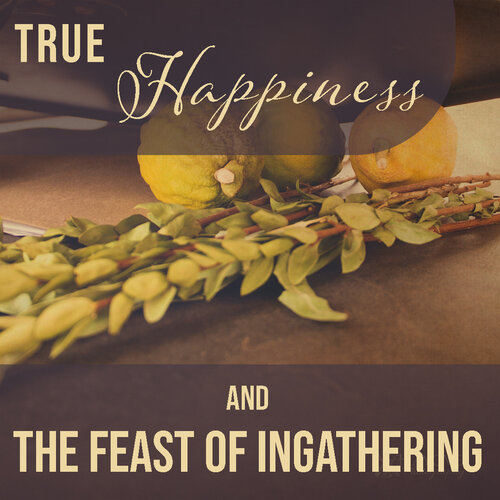Sukkot is commonly known as “Z’man Simchateinu” – “Season Of Our Joy.” This title was given by the sages of Israel based on Leviticus 23:40 and Deuteronomy 16:14-15, where God commands Israel to rejoice during the feast of Tabernacles.
Happiness is one of the most desired emotions. We all crave fulfillment, contentment, and happiness. Myriads of books have been written on how to satisfy these intense desires. The Harvard “Grant Study” began in 1938 when a group of researchers set out to find the keys to a life of happiness. After seventy-five years of extensive research on 268 Harvard undergraduates, their findings are quite revealing!
Their research overwhelmingly proved that relationships are the only things that matter in life. You might have a successful career, money, and good physical health, but without supportive, loving relationships, you would find yourself unhappy. So many of the things we think matter when it comes to happiness don’t actually make any difference. Western culture champions money and social standing as keys to success. These two things were at the bottom of the list.
This is good information, but we still need to know how to have the relationships that bring happiness. No one would say that they don’t want to have healthy relationships. Quite often, though we have good intentions, we find ourselves in situations that we know are less than what we want, but we don’t know how we got there or how to get out.
One of my favorite inspirational speakers is a man by the name of Zig Ziglar. I recently watched a presentation he did on having an attitude of gratitude. He recounted the story of a lady who was desperate to talk to him, hoping he could help her figure out what to do about her terrible situation at work. She told him about how awful her work place, co-workers, and employers were. He patiently listened as she ranted and raved, then he asked her if there was anything she liked about her work. She said absolutely not, and that there was nothing good about it. The people hated her, the work was difficult, her life was miserable and she did not know what to do.
Within five minutes, Mr. Ziglar helped her identify twenty-two things that she liked about her work. He told her to look in a mirror and read through that list every day. About six weeks later Mr. Ziglar was back in the area and the woman excitedly came up to him exclaiming that a miracle had happened. She couldn’t explain it but, in just six weeks, her boss and co-workers had totally changed!
This lady wanted to have good relationships at work. The emotional path of least resistance led her to only see the negative side of her situation. When she took time to intentionally recognize the positive realities of her relationships at work, things changed. Instead of constant negativity, contention, and strife, she was able to have joy and peace.
God created a perfect framework of different kinds of relationships. When we are in fellowship with one another we open the door for God to bring us happiness. As a child, you need the nurturing and discipline of your parents. As a young person, your “fellowship framework” widens to siblings who teach you responsibility, peers who sharpen your social skills, and teachers who equip you with understanding. In adulthood, you need mentors to guide you, a pastor to shepherd you, elders to share wisdom, a spouse to respect and love you, and children to teach you patience, responsibility, and how to love.
This character shaping, emotionally fulfilling, happiness-bringing framework is God’s perfect design to lead you to Him where there is “fullness of joy” (Psalms 16:11). When we embrace relationships with gratitude, recognizing their purpose and importance, we find true fulfillment, contentment, and happiness.
Perhaps that is why Sukkot, the season of our joy, is also called the Feast of Ingathering (Exodus Exodus 23:16, 34:22). Deuteronomy 16:14 says:
“And you shall rejoice in your feast, you and your son and your daughter, your male servant and your female servant and the Levite, the stranger and the fatherless and the widow, who are within your gates.”
God makes a very exhaustive list of everyone from Israel that could possibly come up to Jerusalem for the Feasts. God wants everyone to be involved, and he specifically wants them to be happy – to rejoice in the feast!
Now, you could say, “Wait! This is only talking about the people in Israel. What about everyone else in the world? Doesn’t God want everyone to join in this fellowship and joy?”
The biblical answer is a resounding yes! We know from Zechariah chapter fourteen that the nations are supposed to come up to Jerusalem for the Feast of Tabernacles. Isaiah fifty-six also mentions that people living outside the land of Israel will come up to Jerusalem. It is very interesting that verse seven specifically mentions God making these joined-to-the-Lord foreigners joyful in His house of prayer. Could this “joy” be a direct reference to the “season of our joy” – Sukkot? There is also a connection between God’s house, the nations (70 nations in Genesis 10), and Sukkot in the seventy bulls sacrificed during Sukkot (Numbers 29:12-38) and the ten, seven-branched lampstands that were in Solomon’s Temple (2 Chronicles 4:7).
In a world that promotes isolation, ingratitude, and tearing down the relational framework that God has perfectly designed, during this Sukkot, let’s embrace the ingathering, the fellowship, and the happiness that God offers us in this “season of our joy”, and let us look forward with great anticipation to the day of the great ingathering when we all come in one accord to the Lord’s house in Jerusalem with joy, to worship the King of Kings!

